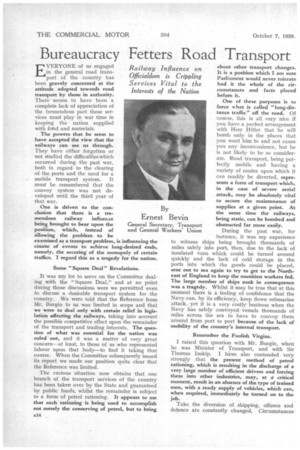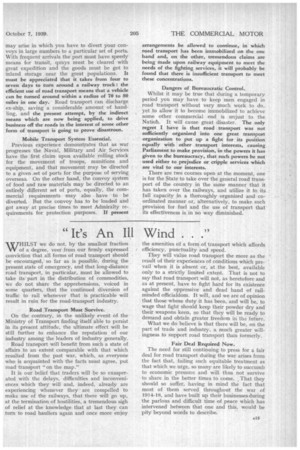Bureaucracy Fetters Road Transport
Page 16

Page 17

If you've noticed an error in this article please click here to report it so we can fix it.
EVERYONE of us engaged in the general road transport of the country has been gravely concerned at the attitude adopted towards road transport by those in authority. There • seems to have been a complete lack of appreciation of the tremendous part these services must play in war time in keeping the nation supplied with food and materials.
The powers that be seem to have accepted the view that the railways can see us through. They have either forgotten or not studied the difficulties which occurred during the past war, both in regard to the clearing of the ports and the need for a mobile transport system. It must be remembered that the convoy system• was not developed until the third year of that war.
One is driven to the conclusion that there is a tremendous railway influer,ce being brought to bear upon the position, which, instead of allowing the problem to be examined as a transport problem, is influencing the course of events to achieve long-desired ends, namely, the securing of the monopoly of certain traffics. I regard this as a tragedy for the nation.
Some "Square Deal" Revelations.
It was my lot to serve on the Committee dealing with the "Square Deal," and at no point during those discussions were we permitted even to discuss a desirable transport system for the country. We were told that the Reference from Mr. Burgin to us was limited in scope and that we were to deal only with certain relief in legislation affecting the railways, taking into account the possible competitive effect upon the remainder of the transport and trading interests. The question of what was essential for the nation was ruled out, and it was a matter of very great concern—at least, to those of us who represented labour upon that body—to find it taking that course. When the Committee subsequently issued its report we made our position quite clear that the Reference was limited.
The curious situation now obtains that one branch of the transport services of the country has been taken over by the State and guaranteed by public funds, whilst the remainder is subject to a form of petrol rationing. It appears to me that such rationing is being used to accomplish not merely the conserving of petrol, but to bring about other transport changes. It is a position which I am sure Parliament would never tolerate had it the whole of the circumstances and facts placed before it One of these purposes is to force what is called "long-distance traffic" off the road. Of course, this is all very nice if you have a perfect arrangement with Herr Hitler that he will bomb only in the places that you want him to and not cause you any inconvenience, but he is not likely to be so considerate. Road transport, being perfectly mobile and having a variety of routes upon which it can readily be diverted, represents a form of transport which, in the case of severe aerial attack, may be absolutely vital to secure the maintenance of supplies at a given point. At the same time the railways, being static, can be bombed and obstructed far more easily.
During the past war, for instance, it was my experience to witness ships being brought thousands of miles safely into port, then, due to the lack of insulated vans which could be turned around quickly and the lack of cold storage in the ports into which the goods could be placed, sent out to sea again to try to get to the Northeast of England to keep the munition workers fed. I he large number of ships sunk in consequence was a tragedy. Whilst it may be true that at this moment there is a feeling of confidence that the Navy can, by its efficiency, keep down submarine attack, yet it is a very costly business when the Navy has safely convoyed vessels thousands of miles across the sea to have to convoy them around from port to port because of the lack of mobility of the country's internal transport.
Remember the Foolish Virgins.
I raised this question with Mr. Burgin, when he was Minister of Transport, and with Sir Thomas Inskip. I have also contended very strongly that the present method of petrol rationing, which is resulting in the discharge of a very large number of efficient drivers and forcing them into other industries, may, at a critical moment, result in an absence of the type of trained men, with a ready supply of vehicles, which can, when required, immediately he turned on to the job.
Take the diversion of shipping, offence and defence are constantly changed. Circumstances may arise in which you have to divert your convoys in large numbers to a particular set of ports. With frequent arrivals the port must have speedy means for transit, quays must be cleared with great expedition and the goods must be got to inland storage near the great populations. It must be appreciated that it takes from four to seven days to turn around a railway truck: the efficient use of road transport means that a vehicle can be turned around within a radius of 70 to 80 miles in one day. Road transport can discharge ex-ship, saving a considerable amount of handling, and the present attempt, by the indirect means which are now being applied, to drive business off the roads in the interest of some other form of transport is going to prove disastrous.
Mobile Transport System Essential.
Previous experience demonstrates that as war progresses the Naval, Military and Air. Services have the first claim upon available rolling stock for the movement of troops, munitions and equipment, and that movement may be directed to a given ,set of ports for the purpose of serving overseas. On the other hand, the convoy system of food and raw materials may be directed to an entirely different set of ports, equally, the commercial requirements may also have to be diverted. But the convoy has to be loaded and got away at precise times to meet Admiralty requirements for protection purposes. If present
arrangements be allowed to continue, in which road transport has been immobilized on the one hand and, on the other, tremendous claims are being made upon railway equipment to meet the needs of the fighting services, it will probably be found that there is insufficient transport to meet these concentrations.
Dangers of Bureaucratic Control.
Whilst it may be true that during a temporary period you may have to keep men engaged in road transport without very much work to do, yet to allow it to become immobilized to achieve some other commercial end is unjust to the Natioh. It will cause great disaster. The only regret I have is that road transport was not sufficiently organized into one great transport organization to put up a fight for its position equally with other transport interests, causing Parliament to make provision, in the powers it has given to the bureaucracy, that such powers be not used either to prejudice or cripple services which are vital to our interests.
There are two courses open at the moment, one is for the State to take over the general road transport of the country in the same manner that it has taken over the railways, and utilize it to its full capacity in a thoroughly organized and coordinated manner, or, alternatively, to make such provision for fuel and the use of transport that its effectiveness is in no way diminished.




















































